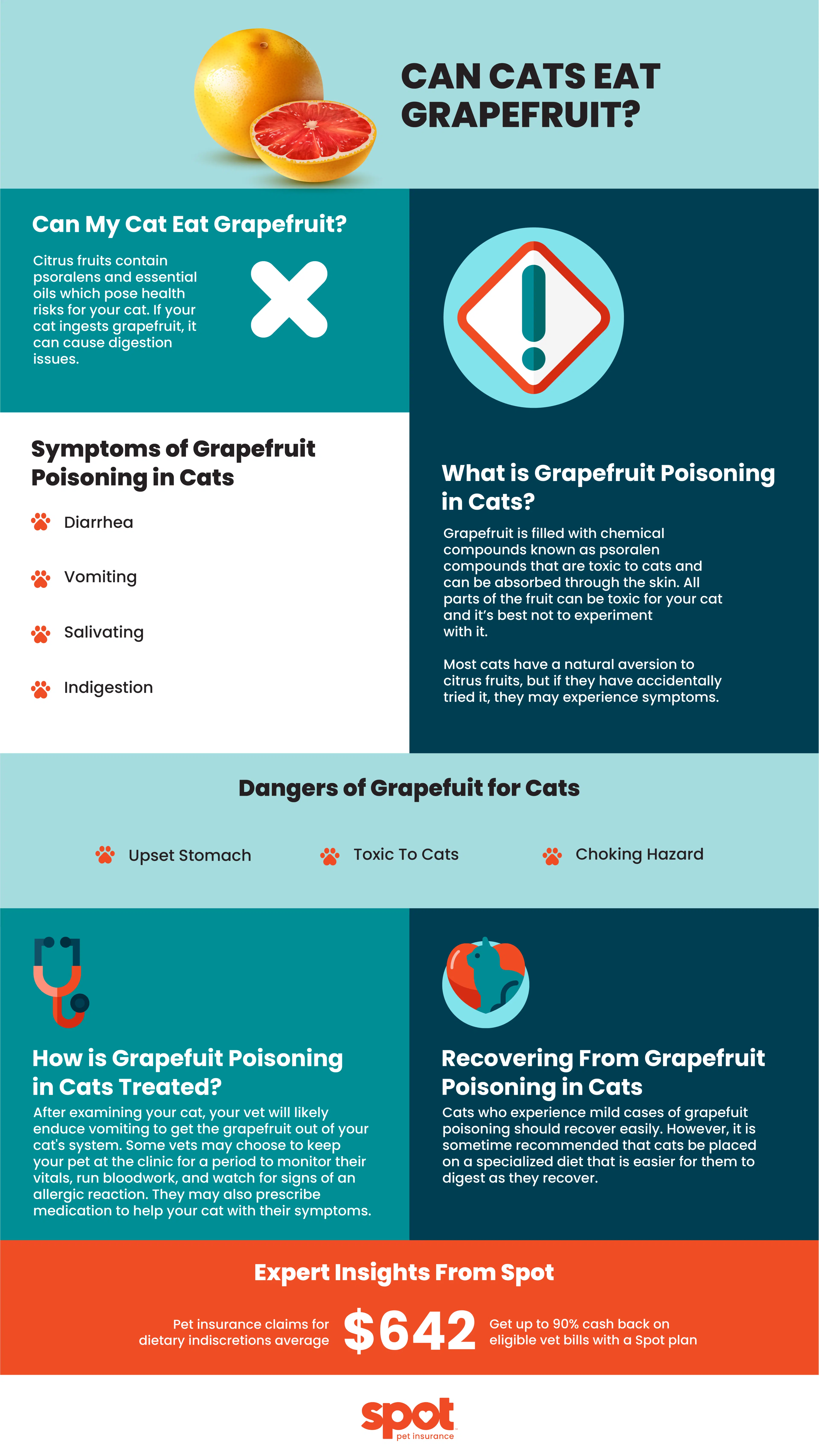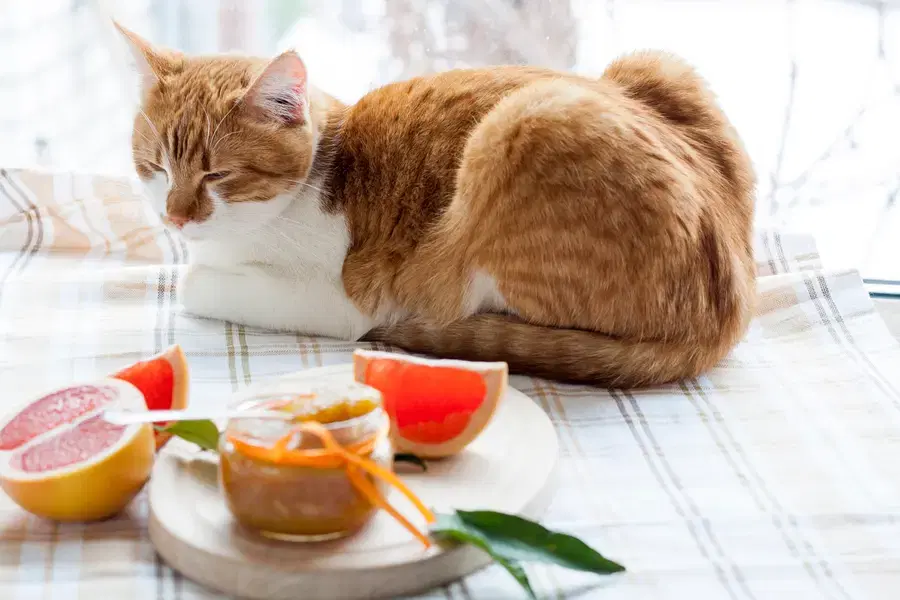We all love sharing food with our cats. But when it comes to citrusy foods, it’s best to avoid them. Grapefruits are very toxic for your cat. So, when the question is “Can your cat eat grapefruits?” the answer is a strict no. Let's dive into this deeper and explore the ways to help prevent your cat from eating them.

Can My Cat Eat Grapefruit?
Citrus fruits contain psoralens and essential oils which pose health risks for your cat.1 If your cat ingests grapefruit, it can cause digestion issues. Cats have a natural aversion and sensitivity to the smell and taste of citrus so they may not be inclined to taste it anyway. However, if your cat has accidentally eaten grapefruit, they may be at risk of grapefruit poisoning.2
What is Grapefruit Poisoning for Cats?
Grapefruit is filled with chemical compounds known as psoralen compounds that are toxic to cats and can be absorbed through the skin. All parts of the fruit can be toxic for your cat and it’s best not to experiment with it. Some symptoms you may notice are vomiting, diarrhea, indigestion, and more. Most cats have a natural aversion to citrus fruits, but if they have accidentally tried it, they may experience symptoms.2 It's important to rush to a vet if you see these signs. If you do want to give your cat fruit, here's a list of fruits cats can eat.
Potential Risks of Cats Eating Grapefruit
Upset Stomach:
Cats are not good at digesting foreign foods. When you feed your cat grapefruits, they may be sensitive to them, and this could lead to digestion issues and an upset stomach.
Toxic To Cats:
The chemical compounds contained in grapefruit like psoralens and essential oils are extremely toxic to cats. Any part ingested can lead to lethargy, sickness, stomach pain, and depression.1
Choking Hazard:
Just like oranges, grapefruits have thin peels that can cause a choking hazard in animals as it does with kids. Because cats have thinner food pipes, the peel can become a choking hazard. If this does happen, contact your vet immediately.
Symptoms of Grapefruit Poisoning in Cats
Common symptoms of grapefruit poisoning in cats include:2
Diarrhea
Vomiting
Salivating
Indigestion
Causes of Grapefruit Poisoning:
Cats have a natural aversion to grapefruit but there are a lot of ways they can still be exposed to it, especially if they are used as an ingredient in a dish. Sometimes, grapefruit aromas can be lit in the house, not realizing it can be toxic to your cat. Some pet owners may also rub grapefruit essential oils on their pets, which is equally harmful. All parts of the grapefruit are toxic, and it can be an ingredient in their food, pet grooming products, etc. It’s best to read the ingredients list of such products to avoid mishaps.
How to Check for Grapefruit Poisoning In Cats
If you feel your cat may have fallen prey to grapefruit poisoning, you need to seek medical help as soon as possible. Be sure to explain to them the cause and exposure. This will help the veterinary team determine which treatment is required. Your vet will likely conduct a few tests on your cat to help understand the situation better.
How To Treat Grapefruit Poisoning in Cats:
After determining your cat’s health and risks, your vet will likely induce vomiting. Other than that, the vet could share a list of medications your cat should have. Your pet may be put under monitored care that will check blood work, functioning of vital organs, and allergies if any.2
Recovering From Grapefruit Poisoning in Cats
How fast your cat recovers from grapefruit poisoning depends on the severity of their symptoms. If your cat hasn’t gone through severe poisoning effects, they should recover quite easily. However, to help your cat recover better, they may need a special diet that is easier on their internal organs.2
Expert Insights From Spot
It's natural to want to share your favorite treats with your pets, but remember that not all human foods are suitable for them. Spot's internal data shows that pet insurance claims for dietary indiscretions average $642*, demonstrating the importance of being careful and researching thoroughly before offering your pets human food.
How Spot Pet Insurance Can Help
At Spot Pet Insurance, we know that unexpected accidents and illnesses can happen at any time. That’s why Spot offers accident and illness and accident-only plan options that can give pet parents up to 90% cash back on eligible veterinary bills. Spot’s plans are customizable so you can create a plan that best fits the needs of your pet and your budget. Choose your deductible, annual limit, and reimbursement rate from a range of options. Get a free quote today!
Conclusion:
While humans love and can truly benefit from grapefruits, it is extremely toxic for your feline friend. The risks that are involved in feeding grapefruit to your cat are far more than any benefits that could come from it. It’s always best to avoid introducing them to foreign fruits or something that they aren’t used to. Allergy or toxicity can look like itching, swelling, bloated stomach, and lethargy. Cats are obligatory carnivores which is why they need to rely on lean meats as a source of protein. If you do sense your cat is experiencing any kind of allergic reaction, consult your vet immediately. You can always opt for lean meats, fish, grass, and store-bought cat treats to help keep their tummy happy.

Creative manager by day, pet enthusiast all the time! After 19 years with my dog (hopefully he wins the award for oldest pet in the world), I enjoy spending my days brainstorming tail-wagging content, and sniffing out the latest trends in the pet world.
*Jan 2019 to Aug 2024 Spot Pet Insurance Services, LLC claims data.
"Can Cats Have Grapefruit?" PetsCare, n.d., https://www.petscare.com/news/post/can-cats-have-grapefruit-guide.
"Grapefruit Poisoning in Cats," Wag, n.d., https://wagwalking.com/cat/condition/grapefruit-poisoning.
The information presented in this article is for educational and informational purposes only and does not constitute or substitute for the advice of your veterinarian.












